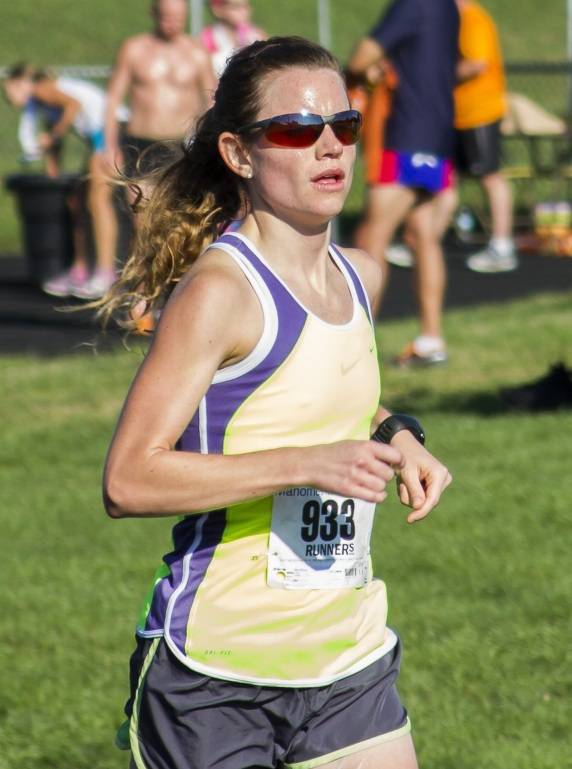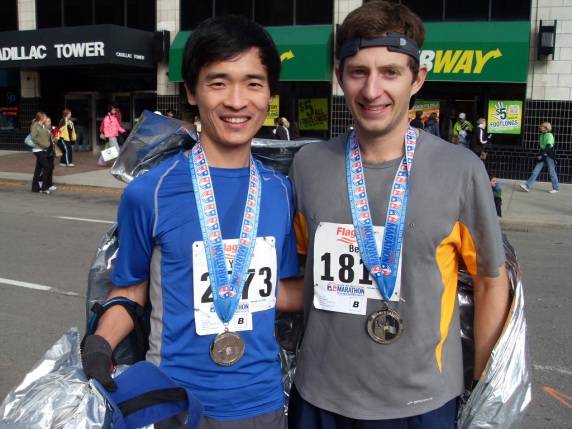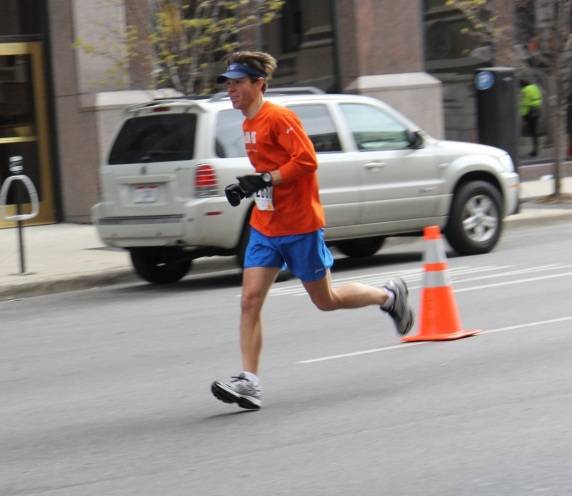Let’s say I haven’t run a marathon in four years and I want to qualify for Boston (BQ). What have I forgotten about running a marathon? That’s one of the questions I posed to three Champaign-Urbana BQ runners as I prepare to run the Arizona Rock ‘n’ Roll Marathon in January. These three are among the speediest people I know, and they are a constant source of inspiration (and consternation, as I consistently lose to them).
Here’s what they had to say.
Ben Newell:
Running marathons is a lot like binge drinking. Post marathon or night of partying, there is much pain and sickness with proclamations of, “I will never do this again!” Once you’ve recovered and the pain is gone, memory fades and the good/fun thoughts have you back at the Esquire or signing up for another marathon. If you haven’t run a marathon in a while, you may have forgotten that a full marathon is not twice as hard as a half marathon. In terms of effort and difficulty, a half marathon would be 21 miles. The last three to six miles of a marathon are the hardest miles you will run in a race anywhere.
Julia Williams:
I’ve only run two marathons: my BQ (Illinois 2011) and Boston (2012), so it’s difficult to answer [your question]. However, I will say that my best guess for what you might have forgotten is just how much you will want to stop running around mile 20 or 22. You may not necessarily hit the “wall,” but the mental strength and willpower required to just keep putting one leg in front of the other may surprise you. My best advice is to routinely visualize a strong finish for weeks leading up to the race. Even if you don’t finish exactly as planned, the image of you nailing the final 10k will pull you through the tough times.

Julia Williams finishes the Mahomet Half Marathon this summer.
Marty Williams (not related to Julia):
It’s more than twice the effort of a half marathon. By quite a bit. I can screw up in racing a half and still not really suffer. I rarely race a full and not suffer severely.
There is a part of me that has forgotten that a marathon is more than just two half marathons. It’s easy to misremember that the first twenty miles or so aren’t the worst part. The last 6.2 miles are the killer. Julia’s advice is meaningful. I will need to visualize myself pushing through that last 10k.
What will it take for me to BQ? It’s one thing to run the distance, and something else to run and try to make Boston. The qualifying times for Boston in my age group is 3:10. My current PR is 3:58:29. I will need to trim 48 minutes off of that.
Ben Newell:
In trying to qualify, my training was very consistent, goal oriented, and grueling. I didn’t just ramp up my mileage. The runs were good quality, grueling, and incorporated different workouts such as speed, hills, tempos, etc. I’ve always been a disciplined runner from a pacing standpoint, but I paid particular attention to my pace during each run workout. I also made it a priority, so socially I cut back on staying out late or drinking too much. I avoided anything that would affect my training the next day.
Julia Williams:
I have to credit my running coach, Joe Bails, for my BQ. Once I committed to running a marathon, I knew BQ was a reasonable goal, but I knew I needed guidance to achieve that. Having a structured plan and great support from Joe allowed me to stay focused and avoid injury and burnout, which was crucial through the twenty weeks of marathon training. Also, my training partners were key: speed workouts with Patrick Rietz and long runs headed up by Ben Newell with the Second Wind Marathon Training Program.
Marty Williams:
When attempting to qualify, I trained for a faster pace than I actually needed. More distance, faster pace, harder cross training, etc. I’d rather be over-trained (without injury) than trained barely enough.
Let me pat myself on the back for this one because I’ve been doing the right things. I’ve ramped up my miles using a Runner’s World 3:00 marathon goal training plan available through Training Peaks. It syncs with my GPS sportswatch. I’ve followed the training religiously, mixing hill work, speed work, tempo, race pace, and long, slow, distance runs. The three PRs I’ve amassed in the half marathon this fall have also been good practice. I’m training for a three-hour marathon. If all goes well, that gives me ten minutes of “what have I done” time through miles 21 to 26.2.
I’d say the training has helped me the most, but training can do only so much. Runners need support. What (or whom) do these BQ runners credit with helping them most in their BQ run?
Ben Newell:
My training partner Yong Zeng and I pursued the goal of qualifying for Boston together after our first marathon in Chicago. It was great having someone to compete with along the way. All of my Second Wind Running club running companions and the programs they offer were also a big help, especially the weekend-long run course marking and aid stations.

Ben Newell and Yong Zeng at the 2008 Detroit Marathon.
Breaking 3:10 is a daunting challenge, and there are times when my emotions swing from “I’m crazy,” to “I’m gonna nail this!” But what do my friends think the greatest challenge will be in running a marathon under BQ?
Ben Newell:
Maybe stop reading here; I don’t want to discourage you. 3:10 is HARD! I had run a 1:29 half marathon prior to attempting my BQ, and the pace calculators will project a 3:07. Well, I worked my ass off training for that 3:09:26, and the last three miles of my race were the most difficult miles I have ever run! Correlating half marathon or any short distance time to a marathon finish time is tough.
I think your greatest challenges, having been so long since running a marathon, are (a) not having a good gauge of your marathon fitness and how your body will react to the final miles of the race, and (b) whether the work you put in for your half PR will translate to a 3:10 or if you need to over-train. Keeping pace for 26.2 miles is tough, and I know several dedicated, hard working sub 1:30 half marathoners whose marathon PRs are ~3:15–3:20.
Julia Williams:
I think the greatest challenge of running an aggressive marathon is discipline. Of course, the first significant portion of the race will (and should) feel easy, but in a marathon, picking up pace too early can really affect you later in the race. I believe this is due to the large mental component of the marathon — the focus it requires is incredibly taxing on top of the physical challenge.
Marty Williams:
If you haven’t done a marathon in four years, then running a sub 3:10 (3:10:01 just doesn’t count) could be somewhat exceptional. It’s possible, but I think a lot of things beyond your control will need to be on your side. You know, weather, health, travel luck, etc.
If it doesn’t come together exactly as planned in January, keep your chin up. You’re in this for the long run. There are so many benefits from distance running, in the bigger picture, what does it really matter if you run a 3:09 or a 3:29 or even a 5:00?

Marty Williams in flight at the Indianapolis Marathon this fall.
Sobering. That’s what this is. Right now, I feel disciplined. I feel confident. I’m in the best shape of my life. Yet, what Ben, Julia, and Marty say is eye opening. I must prepare myself for failure, yet understand that discipline, starting slowly, and running with confidence could be the difference between reaching my goal.
I have no doubt that, barring a disaster, I will PR. Will I BQ though? That remains to be seen.








